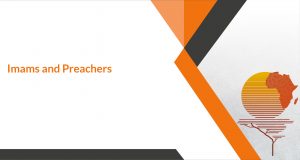Imams and Preachers

The number of imams matches that of mosques, i.e., fifty-two thousand, in addition to religious caretakers other than imams, such as muezzins, cleaners and inspectors.
In the past, it was customary for the imam of the village to receive a yearly compensation in kind or a sum of money each year for his work, along with a daily supply of provisions, known as sharṭ. In cities, it was the waqf institution that ensured imams’ sponsorship.
Today, however, imams receive a monthly grant from the Ministry of Religious Endowments and Islamic Affairs, with full health coverage and social services from the Mohammed VI Foundation for the Advancement of Social Work of the Clergy.
A small percentage of the imams receive compensations from benefactors, without interfering in their mission of imamate and their sermons.
In addition to leading prayers, a number of imams perform the task of teaching the Qur’an to children.
In rural areas, Imams are the ones who deliver the Friday sermon; in the cities’ big mosques, preachers are often not imams; most of them are teachers, judges or self-employed.
The imams, orators and preachers are informed in their mission by the “Guide of the Imam, the Orator and the Preacher” put forth by the Ministry of Religious Endowments and Islamic Affairs and reviewed and endorsed by the Higher Scientific Council.
The imams of the mosques come from different religious scholarly levels. In the past, the lowest qualification was that the imam should be a ḥāfiz, or memorizer, of the Qur’an and knowledgeable about the requirements of prayer leadership. Today, the imams’ scholarly level has greatly improved in general, as the new imams must receive a recommendation, after passing a test, from a local scientific council. Furthermore, young people can become imams.
The Ministry of Religious Endowments and Islamic Affairs organizes for all imams in the kingdom’s mosques a continuous training that is held twice a month, on the first Saturday and the third Saturday.
Friday preachers are free to choose the topics of their sermons; sometimes the Ministry of Religious Endowments and Islamic Affairs sends a sermon the subject of which is to raise awareness about some issue that concerns the community, such as vaccination against infectious diseases or the prevention of traffic accidents or topics related to the environment.
The topic of the Friday sermon, according to prophetic tradition, is to underline the tenets of religion and the call to behave in accordance with articles of faith, transactions and noble traits of character; the preacher can address all topics based on what is stated in the Qur’an and Sunnah, while avoiding mention of people by name and discussion of issues he has no knowledge of.
The Friday sermon is delivered every week in more than twenty-three thousand mosques, which means that the number of sermons each year exceeds one million. Rarely are the cases in which the Ministry of Religious Endowments and Islamic Affairs observe deviations in the content of these sermons from the legal framework, and in which the preacher drifts into normal journalese style about which an apology is often offered stating that the intended purpose is not what the listener understood.
